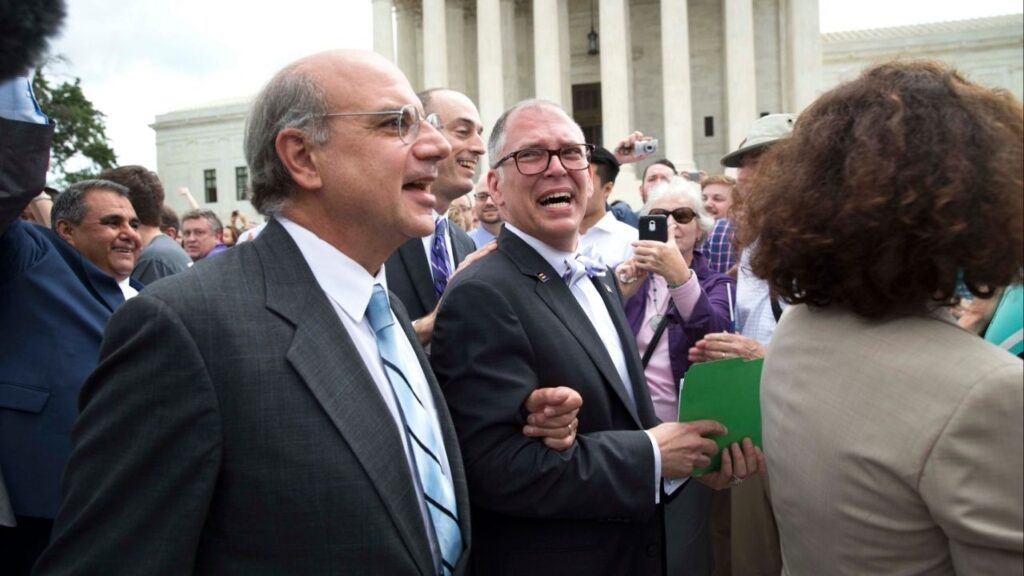FILE — Rob Bresnahan Jr., a Republican congressional candidate, speaks at Donald Trump at a campaign event in Hazel Township, Pa., on Nov. 3, 2024. Bresnahan is one of many Congressional Republicans now facing tough votes that would cut popular programs to pay for President Donald Trump’s agenda. (Eric Lee/The New York Times)

- GOP members in swing districts must vote on slashing Medicaid by $880 billion over the next decade.
- Democrats anticipate political fallout for Republicans supporting cuts to popular government programs.
- Some vulnerable Republicans hope to find alternative cost-saving measures, avoiding direct Medicaid cuts.
Share
WASHINGTON — Rep. Gabe Evans, R-Colo., secured his ticket to Washington in November when he defeated a Democratic member of Congress by less than 1 percentage point — just 2,449 votes.
Now Evans, 39, is helping to write legislation that could cement his own ticket back home.
The first-term Congress member, whose swing district just north of Denver includes 151,749 Medicaid recipients, sits on the Energy and Commerce Committee. The Republican budget resolution that lays the groundwork for sweeping legislation to enact President Donald Trump’s domestic agenda instructs the panel, which has jurisdiction over Medicaid, to slash spending by $880 billion over the next decade to help pay for a large tax cut. That number is impossible to reach without substantially reducing the cost of Medicaid, the government program that provides health insurance for lower-income Americans.
Pressure Mounts on Swing-District Republicans
As Republicans in Congress struggle to coalesce around the core pieces of what Trump calls his “one big, beautiful bill,” Evans and other GOP lawmakers from some of the most competitive districts in the country are facing committee votes next week to approve cuts to popular programs that could come back to haunt them politically.
And Democrats are gleeful at the prospect of Republican incumbents going on the record supporting the effort.
“These members of Congress won with fewer votes than the number of people in their district on Medicaid,” said Jesse Ferguson, a veteran Democratic strategist and a former spokesperson for the Democratic Congressional Campaign Committee. “Voting for this is like being the captain of the Titanic and deciding to intentionally hit the iceberg.”
The group includes Rep. Mariannette Miller-Meeks, R-Iowa, who also sits on the Energy and Commerce Committee and is on even shakier ground than Evans, despite having warded off a challenger multiple times. Last year, Miller-Meeks, who represents 132,148 Medicaid recipients, won her seat by 0.2%, or 799 votes. Her local office in Davenport has been besieged by demonstrators concerned about spending cuts.
Also on the panel is Rep. Thomas H. Kean Jr., a Republican from a highly competitive district in New Jersey.
On the Agriculture Committee, which must find $230 billion in cuts over a decade, Republicans are feuding over how much to slash from federal food assistance programs, with those from competitive seats wary of reductions that could hit their constituents. That panel also includes some of the most endangered Republicans in the House: Reps. Rob Bresnahan Jr., a first-term Republican from Pennsylvania; Don Bacon of Nebraska; Zach Nunn of Iowa; and Derrick Van Orden of Wisconsin.
Both committees are expected to meet next week to work on and finalize their bills, although that could change if Republicans fail to reach agreement on what cuts should be included. The panels had been slated to meet this week but pushed off the meetings amid lingering disagreements.
“Many of them have been talking in private to their leadership, telling them that this is a really tough vote for them,” Rep. Angie Craig of Minnesota, the ranking Democrat on the Agriculture Committee, said of Republicans.
Intra-Party Divisions and Delayed Decisions
Adding to their dilemma, Trump has said he does not want to “touch” Medicaid, and some far-right thought leaders are blaring alarms about cutting the program.
“Medicaid — you got to be careful, because a lot of MAGA’s on Medicaid,” Steve Bannon, the former adviser to Trump, said recently on his “War Room” podcast. More than 60% of Trump voters said Medicaid was “very important” to their communities, according to a recent KFF poll.
As the GOP struggles to cobble together legislation that can please its right flank, which is demanding deep cuts, without alienating moderates who oppose them, many vulnerable lawmakers fear that they are setting themselves up to take a tough vote on something that may never become law.
Rep. Nick LaLota, R-N.Y., who opposes Medicaid cuts, said he and his colleagues had no interest in going through the difficult process of writing and voting for a bill that ultimately could not pass the Senate, which has embraced a fraction of the spending cuts the House has.
“We’re not looking to float a trial balloon,” LaLota said in an interview. “We only want to vote for something that’s real, that’s passable by the Senate and that the president will sign.”
Such concerns are one reason that Speaker Mike Johnson was forced this week to drop one of the most aggressive options the GOP was considering to cut Medicaid costs: lowering what the federal government pays states to care for working-age adults who became eligible for the program through the Affordable Care Act’s Medicaid expansion.
Privately, many Republicans on Capitol Hill said they expected the House to miss its self-imposed Memorial Day deadline to write and pass the bill, and eventually settle on a Senate-approved package of tax cuts that includes no major changes to Medicaid, food assistance or any other popular program. Such an outcome would enrage fiscal conservatives on the hard right, who are demanding that the package not add to the deficit and who could bring down the whole package if they refused to go along.
Searching for Viable Solutions Amidst Political Risks
Some vulnerable Republicans who oppose cutting Medicaid said they were still hoping to find other ways to reduce the program’s costs, such as imposing work requirements and tightening rules to ensure that immigrants living in the country without legal permission, who are barred by law from the program, cannot receive any of its services. And they note that there are other proposals to raise the federal revenue needed to offset tax cuts.
“There are ways to cut the Energy and Commerce budget which aren’t just health care,” LaLota said. “I’m not so fatalistic that it’s a tough vote.”
But cleaning up Medicaid fraud and tightening rules generate far less money than what the Republican plan requires. And the Congressional Budget Office on Wednesday wrote that after estimating the budget impact of four different options for cutting Medicaid, all of them would have the same overall result: “enrollment would decrease and the number of people without health insurance would increase.”
Evans, for his part, has been trying to thread the needle by criticizing the way his state administers Medicaid, charging that it has paid millions of dollars to deceased people and immigrants living in the country without legal permission.
“The overall goal is to be able to protect the program by cutting out the fraud, waste and abuse,” he told a Colorado public radio station last month. He declined to comment for this article.
Craig said her hope was that some center-leaning Republicans would stand up to their leaders and simply draw a red line on any cuts to the Supplemental Nutrition Assistance Program or Medicaid.
“The real question is whether the moderates on my committee are really going to take this to the mat and fight these cuts or if they’re going to cave,” Craig said.
—
This article originally appeared in The New York Times.
By Annie Karni/Eric Lee
c.2025 The New York Times Company



















